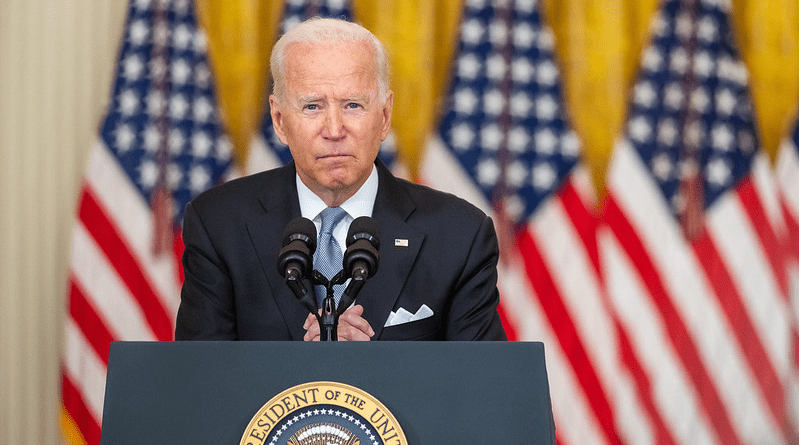Isolated Internationally On Gaza, Biden Delivers Rebuke To Netanyahu
By VOA
By Patsy Widakuswara
In a sign that the United States is getting increasingly concerned over the scale of civilian casualties from Israel’s military campaign in Gaza, President Joe Biden delivered a public rebuke to Prime Minister Benjamin Netanyahu on Tuesday, even as he maintains staunch support for Israel.
“We have made it clear to the Israelis, and they are aware that … the safety of innocent Palestinians is still a great concern. And so, the actions they’re taking must be consistent with attempting to do everything possible to prevent innocent Palestinian civilians from being hurt, murdered, killed, lost, etc,,” Biden said at a press conference during Ukrainian President Volodymyr Zelenskyy’s visit to the White House.
Zelenskyy is in the U.S. to lobby for military and economic aid for his country’s fight against Russia’s invasion. Aid to Ukraine and Israel are being blocked by Republican lawmakers who are demanding concessions on U.S. immigration policy.
Biden has grown more vocal with his public criticism of Israel’s military campaign that is now into its third month. Speaking off-camera to Democratic donors for his 2024 reelection bid earlier Tuesday, Biden said Israel is starting to lose support around the world because of its “indiscriminate bombings,” according to a White House transcript of the event.
Biden’s comment stands in contrast to those of White House officials who say Israel has taken measures to make their strikes more targeted to avoid civilian deaths.
“He’s [Netanyahu] a good friend, but I think he has to change. … This government in Israel is making it very difficult for him to move,” Biden said.
The president singled out Itamar Ben-Gvir, Israel’s far-right national security minister.
“Ben-Gvir and company and the new folks, they don’t want anything remotely approaching a two-state solution,” he said. “They not only want to have retribution, which they should for what the Palestinians — Hamas — did, but against all Palestinians.”
He suggested Netanyahu will need to empower the Palestinian Authority to become a partner in the peace process toward the two-state solution, which Israeli hard-liners oppose.
“You cannot say there’s no Palestinian state at all in the future. And that’s going to be the hard part,” Biden said, even as he underscored that the U.S. will not do “a damn thing other than protect Israel in the process.”
Biden said national security adviser Jake Sullivan will travel to the region this week and meet with the Israeli war Cabinet to emphasize U.S. commitment to Israel, as well as the need to protect civilian life and ensure more humanitarian assistance into Gaza.
Defense Secretary Lloyd Austin will also travel to the region to step up international efforts to protect the free flow of commerce through the Red Sea that has been disrupted by Iran-backed Houthi militants attacking vessels heading into Israel.
Cease-fire resolution
Biden’s remarks came amid an overwhelming vote at the United Nations General Assembly supporting a cease-fire in Gaza that further isolates Washington. The vote in the 193-member world body was 153 in favor, 10 against and 23 abstentions.
“Our duty is to try to save the lives who are still alive by having this resolution adopted and by forcing Israel to comply with it. And those who are shielding Israel to comply with the global consensus,” said Riyad Mansour, Palestinian permanent observer to the United Nations.”
The vote followed a similar resolution in the U.N. Security Council last week that failed due to a U.S. veto. There are no vetoes in the General Assembly.
While General Assembly resolutions are nonbinding, they carry political weight. U.N. member states are shaping “the narrative that the U.S. is standing alone in opposing the cease-fire,” and “looking for every means possible to create a sense of moral pressure on the U.S. to change its posture,” said Richard Gowan, U.N. director of the International Crisis Group.
“The Arab group at the U.N. wants to make the Americans nervous,” he told VOA. “It wants to send the message that America is losing international goodwill because of its stance.”
Biden’s critics say his unwavering support to Israel jeopardizes Washington’s interests.
The administration is inflicting “deep damage and lasting damage” to its ties with key countries beyond the Middle East, said Josh Paul, a former U.S. diplomat who resigned in protest over U.S. policy of sending arms to Israel without oversight.
“But also, where we are arguing, for example, in the United Nations to gain the support of the Global South for our just condemnation of Russia’s abhorrent invasion of Ukraine,” Paul told VOA. “We are also going to lose votes if we are seen to be hypocritical, if we’re seen to be walking away from our values.”
Administration officials and other supporters of Israel say they support humanitarian pauses but that a cease-fire would allow Hamas, a U.S.-designated terror organization, to regroup and plan future attacks.
A cease-fire allows Hamas to have a legitimacy that it hasn’t earned, said Julie Rayman, managing director of policy and political affairs at the American Jewish Committee.
“It’s giving trust to terrorist leaders who have proven unequivocally that they are not trustworthy,” she told VOA.
Hamas fighters stormed from the Gaza Strip into nearby Israeli towns on October 7, killing 1,200 people and taking more than 200 hostages. Gaza health officials say Israel’s military response has displaced at least 2 million people and killed more than 18,000 in the bloodiest campaign of the decadeslong Israeli-Palestinian conflict.
VOA’s United Nations correspondent Margaret Besheer contributed to this report.

